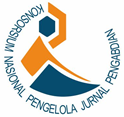Peningkatan Kemampuan Guru Pendidikan Jasmani Dalam Merancang Permainan dan Olahraga di Sekolah Dasar Melalui Forum KKG
Abstract
Jasmani Olahraga dan Kesehatan (PJOK) dalam menyelenggarakan pembelajaran, khususnya dalam merancang model permainan berbasis Teaching Game for Understanding (TGfU) yang digunakan untuk mendidik siswa melalui gerak. Kegiatan ini dilakukan di forum KKGO Kecamatan Paga Kabupaten Malang dengan melibatkan 30 guru PJOK. Metode pelatihan menggunakan model workshop dan lesson study. Keberhasilan pelatihan dapat dicermati secara proses dan hasil, yaitu tingginya tingkat partisipasi dan semangat guru dalam mengikuti pelatihan, dan dihasilkannnya produk yang pelatihan berupa bentuk-bentuk permainan yang digunakan dalam pembelajaran, serta tersusunnya rancangan pembelajaran yang relevan dengan kebutuhan guru.
Kata Kunci: Model permainan, pembelajaran pendidikan jasmani olahraga dan kesehatan, kompetensi guru
Abstract
This community service activity aims to improve the ability of Physical Education and Health (PJOK) teachers in carrying out learning, especially in designing game models based on Teaching Game for Understanding (TGfU) which are used to educate students through movement. This activity was carried out at the KKGO forum, Pagak District in Malang Regency, involving 30 PJOK teachers. The training method used in this study was a workshop model and lesson study. The success of the training can be observed in terms of the process and results, namely the high level of participation and enthusiasm of teachers in participating in the training, and the production of training products in the form of games used in learning, as well as the preparation of learning designs that are relevant to the needs of teachers.
Keywords: Game models, Learning physical education, sports and health, Teacher competence
Full Text:
PDFReferences
Armour, K. M., & Yelling, M. (2007). Effective professional development for Physical Education Teachers: The role of informal, collaborative learning. Journal of Teaching in Physical Education, 26, 177-200.
Bell, B. (2005). Teacher development a model from science education. London -Washington, D.C.: Falmer Press the Taylor & Francis e-Library.
Boyle, B., Lamprianou, I., & Boyle,T. (2005). A longitudinal study of teacher change: What makes professional development effective? Report of the second year of study. School Effectiveness and school improvement, 16,1.
Butler, J., Oslin, J., Mitchell, S., & Griffin, L. (2008). The way forward for TGfU: Filling the Chasm between Theory and Practice. Physical & Health Education Journal, 74(1).
Chen, W., Stephen, L. C., & Theresa, P. C. (2007). A collaborative approach to developing an interdisciplinary unit. Journal of Teaching in Physical Education: Gale Economic Education Humanities Social-Science Arts, 1(2), 26.
Creemers, B., Kyriakides, L., & Antoniou, P. (2013). Teacher professional development for improving quality of teaching. New York London: Springer Dordrecht Heidelberg
Fairclough, S. J., & Stratton, G. (2006). A review of physical activity levels during elementary school Physical education. Journal of Teaching in Physical Education, 25(2), 240-258.
Harvey, S., Song, Y., Baek, J. H., & Van Der Mars, H. (2016). Two sides of the same coin: Student physical activity levels during a game-centred soccer unit. European Physical Education Review, 22(4), 411-429.
Holt, N.L., Strean, William B., Bengoecha, E. G. (2002). Expanding the teaching games for understanding model : New avenues for future research and practise. Canada : University of Alberta.
James, A. R. (2011). The marginalization of physical education: Problems and solutions, Part 1—Introduction. Journal of Physical Education, Recreation & Dance (JOPERD). 82(6), 15-16.
Kaur, B., Kwon, O. N., & Leong, Y. H. (2017). Professional development of mathematics teachers, An Asian Perspective. Singapore: Springer Science.
Kemmis, S., McTaggart, R., & Nixon, R. (2014). The action research planner. Doing Critical Participatory Action Research. London: Springer.
La Vine., Mary, E., & Bechtel, P. (2015). All for one and one for all: A Collaborative Approach to Professional Development. Journal of Physical Education and Sports Management, 2(1), 71-89.
Leonard, H. S., & Marquardt, M. J. (2010). The evidence for the effectiveness of action learning. Action Learning, Research and Practice, 2(7), 121-136.
Levine, T. H., & Marcus, A. S. (2010). How the structure and focus of teachers' collaborative activities facilitate and constrain teacher learning. International Journal of Teachers' Professional Development, 26(3), 389-398.
Light, R. (2003). The joy of learning: Emotion and learning in games through TGfU. Journal of Physical Education New Zealand, 36(1), 93-108.
Mckeen, K., Webb, P. I., & Pearson, P. J. (2007). Promoting physical activity through teaching games for understanding in undergraduate teacher education. In J. A. Diniz (Eds.), AIESEP 2005 World Congress.
Merlen. (2002). Belajar dan pembelajaran. Jakarta: PT Rineka Cipta
Moolenaar, N. M., Sleegers, P. J. C., & Daly, A. J. (2012). Teaming up: Linking collaboration networks, collective efficacy, and student achievement. International Journal of Teachers' Professional Development, 28(2), 251-262.
Mu’arifin. (2017). Pengembangan model pembinaan profesionalitas guru PJOK dalam Menyelenggarakan Pembelajaran. Disertasi tidak diterbitkan. Pascasarjana Unesa.
National Research Council. (2007). Enhancing professional development for teachers: potential uses of information technology. Report of a Workshop.Washington, DC: The NationalAcademies Press.
Neil, R. (2006). Current models and approaches to in-service teacher education. British Journal of In-Service Education, 2(12), 58-67.
Reimers, E. V. (2003). Teacher professional development: an international review of the literature. International Institute for Educational Planning. UNESCO.
Renshaw, I., Araújo, D., Button, C., Chow, J. Y., Davids, K., & Moy, B. (2016). Why the constraints-led approach is not teaching games for understanding: A clarification. Physical Education and Sport Pedagogy, 21(5), 459-480.
Runhaar, P., Sanders, K., & Yang, H (2010). Stimulating teachers' reflection and feedback asking: An interplay of self-efficacy, learning goal orientation, and transformational leadership. International Journal of Teachers' Professional Development, 26(5), 1154-1161.
DOI: http://dx.doi.org/10.17977/um045v4i2p121-128
Refbacks
- There are currently no refbacks.
Email: karinov@um.ac.id

This work is licensed under a Creative Commons Attribution-ShareAlike 4.0 International License.






